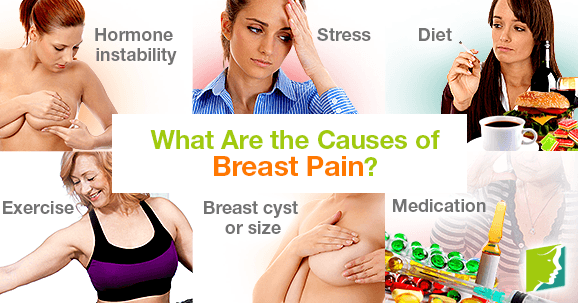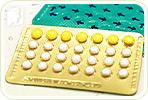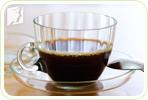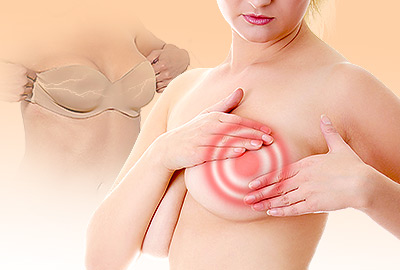Breast pain refers to any feelings of discomfort, tenderness, and soreness in the breasts. The chief cause of breast pain during menopause is hormone fluctuation. There are two types of breast pain: cyclical and non-cyclical. Cyclical breast pain linked to a woman's hormones and menstrual cycle. Non-cyclical breast pain includes causes like cysts and medication side effects. Dull, aching pain, and tenderness are all common characteristics of breast pain. Keep reading for more detail on the causes of breast pain.
Causes
There are many causes related to breast pain, especially in menopausal women. The most common are:
Hormone instability
As previously stated, fluctuations of estrogen, progesterone, and testosterone during menopause are the leading cause of breast pain. These hormonal changes can inflame breast tissue, which results in pain. Premenopausal women are more susceptible to cyclical breast pain because of the periodic fluctuations experienced every month with their menstrual cycle.
Stress
Stress is a primary cause for many menopausal symptoms, including breast pain, headaches, and fatigue. Managing stress is vital for both physical and mental health. Practicing yoga, meditation, reading, and listening to music are all known stress relievers.
Diet
Foods that are high in salt and saturated fats can trigger breast pain. Additionally, alcohol and caffeine are also breast pain triggers. They are acceptable when consumed in moderation, but excessive intake of alcohol or caffeine severely dehydrates the body and makes it more susceptible to breast pain.
Exercise
Unfortunately, exercise can cause breast pain. A recent study published by The British Journal of Sports Medicine examined the correlation between breast pain and exercise in active women. The results showed that exercise significantly influences breast pain. It may seem counterintuitive to continue exercising, but it has been shown to provide numerous health benefits in the long run. Researchers say poorly-fitted sports bras are a main cause of breast pain, so it is crucial to get a properly fitted bra before working out.
Breast cyst or size
Breast pain can be caused by a cyst, which is a fluid-filled sac that can develop in the breasts, and is usually benign. That being said, it is still recommended to see a doctor to be sure that the cyst is harmless. Breast size can also impact pain and tenderness; typically, larger breasted women are more prone to breast pain than women with smaller breasts.
Medication
Breast pain is a common side effect of certain medications like oral contraceptives, antidepressants, and cholesterol and heart medication. It is important to be aware of the side effects of your medication, and if you think they are linked to your breast pain, talk to your doctor about changing your treatment.
Breast pain is a common problem that affects over two-thirds of women at some point in their lives. The main cause of breast pain is hormonal fluctuations, which typically occur during menstruation, pregnancy, and menopause. Other causes of breast pain include medication, exercise, and breast cysts. Several helpful tips for easing breast pain are applying cold compresses to the breasts, taking a warm bath with essential oils, and exercising regularly (with a properly fitting bra).
Sources
- Brown, N. et al. (2013). The experience of breast pain (mastalgia) in female runners of the 2012 London Marathon and its effect on exercise behavior. The British Journal of Sports Medicine, 48(4), 283. doi: 10.1136/bjsports-2013-092175
- Mason, B.R. , Page, K.A. & Fallon, K. (1999). An analysis of movement and discomfort of the female breast during exercise and the effects of breast support in three cases. Journal of science and medicine in sport, 2(2), 134-144. Retrieved from http://www.ncbi.nlm.nih.gov/pubmed/10476977
- National Health Service UK. (2012). Cyclical Breast Pain. Retrieved August 25, 2014, from http://www.nhs.uk/conditions/breastpaincyclical/pages/introduction.aspx
- University of Maryland Medical Center. (2012). Breast Pain. Retrieved August 25, 2014, from http://umm.edu/health/medical/ency/articles/breast-pain




